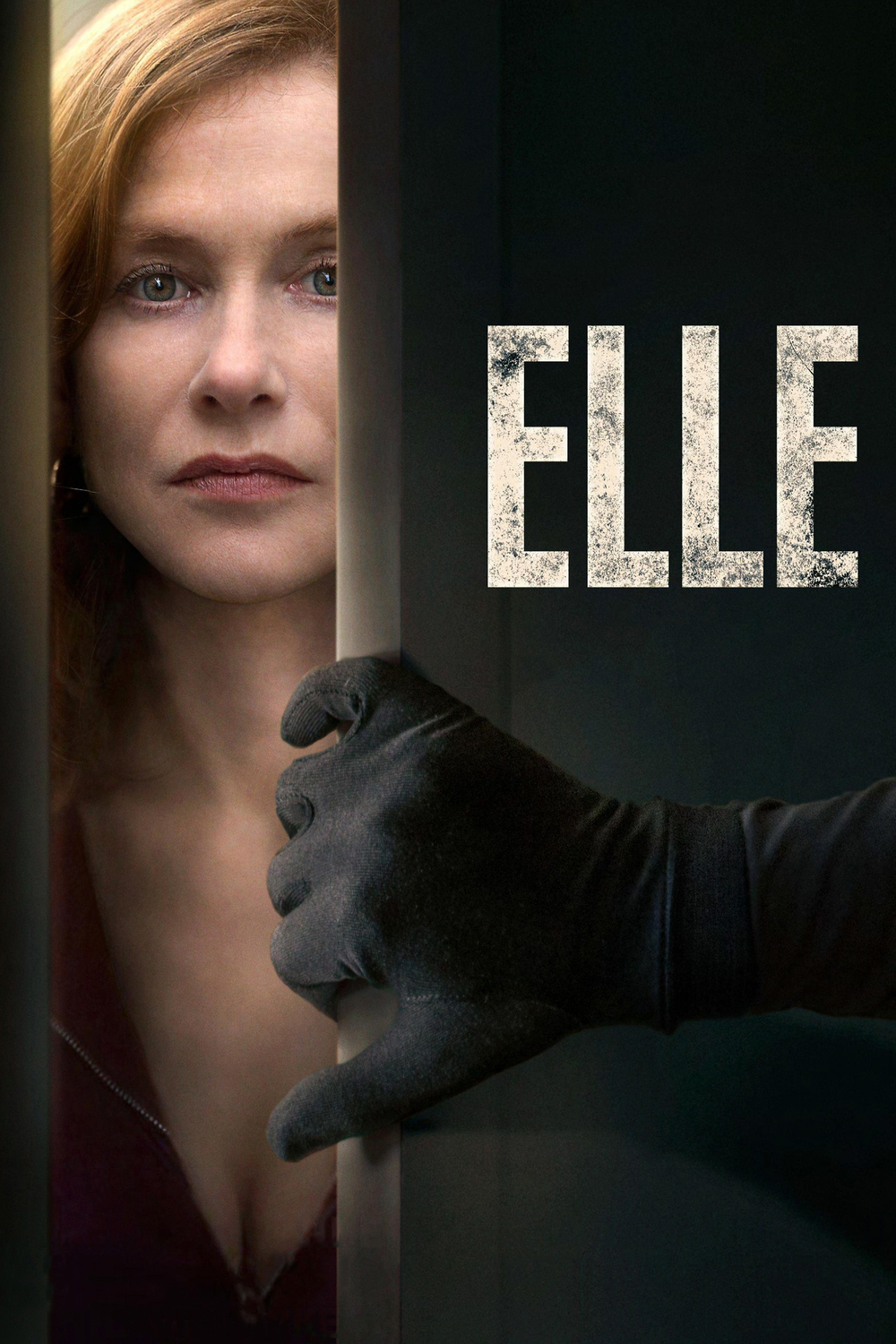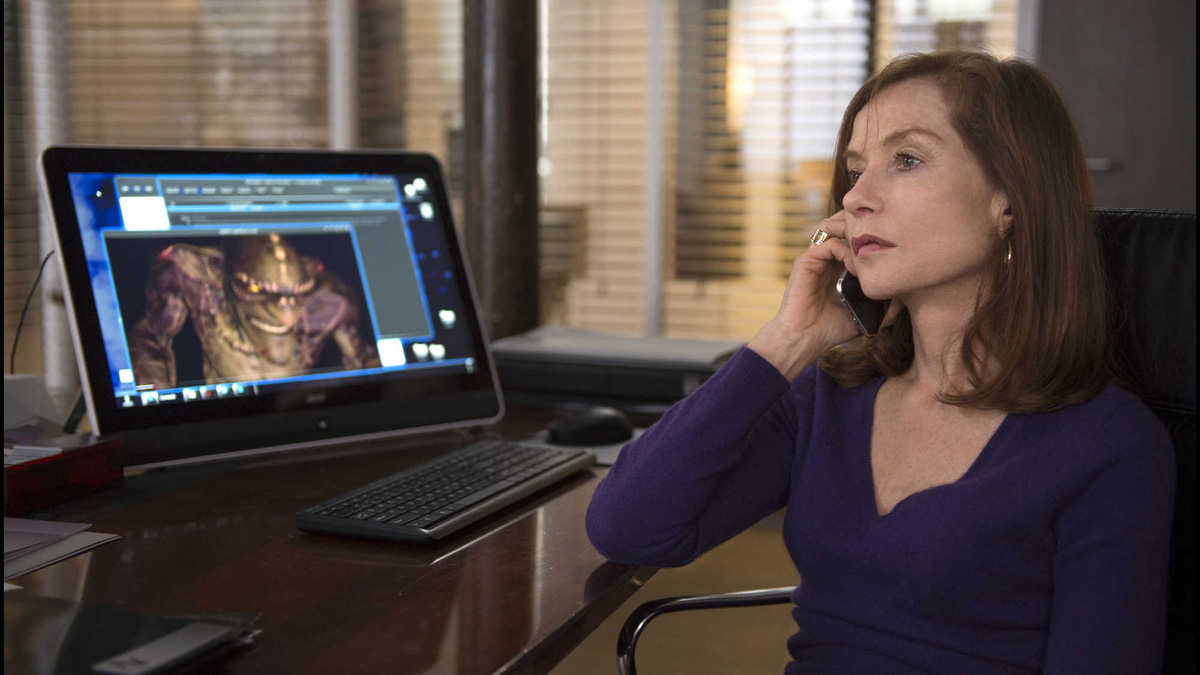
Your complimentary articles
You’ve read one of your four complimentary articles for this month.
You can read four articles free per month. To have complete access to the thousands of philosophy articles on this site, please
Films
Elle
Terri Murray scrutinises a feminist film about a woman who desires her rapist. Warning: SPOILERS
At first glance, director Paul Verhoeven’s film Elle (2016) might seem a far cry from a feminist treatise, but then no one has ever been accused of getting Verhoeven right at first glance. His film Basic Instinct (1992) was probably the most empowering film for women of its generation, but that didn’t prevent critics from both the religious right and the radical feminist left railing against it. Those feminists insisted that it was ‘lesbophobic’, despite depicting female, and especially lesbian, sexuality in a positive light, while also providing sharp satirical jabs at American male chauvinism and machismo.
Throughout his career, Verhoeven has consistently represented empowered female characters, in films such as such as Showgirls, The 4th Man, and Black Book, to name just a few. Elle is no exception. Verhoeven’s most recent release is about how resilient, smart, capable and sexually powerful women are nevertheless disempowered, and participate unwittingly in their own subjugation. In this Verhoeven is not out to diminish women, but rather to dissect and analyse female disempowerment and why feminism fails. This is not a patriarchal film, but a film about patriarchy and its detrimental consequences. Feminists can learn a lot from the film if they look past first impressions and read the subtext.
The Damage Done

Elle is ostensibly about a psychologically damaged woman, Michèle (Isabelle Huppert), who runs a successful video games company together with her best friend Anna. Through childhood trauma inflicted by her serial murderer father, Michèle has internalised a monstrous image of herself that was constructed by the news media. So implicated has she become in her patriarch’s guilt, and so thoroughly complicit in her culture’s transference of his crimes to herself, that she cannot escape a vicious cycle of sadomasochism: willfully cruel towards other women, yet also thoroughly masochistic in her self-loathing. This is her ‘normal’. Verhoeven’s film subtly suggests that it is also ours. Michèle is ‘Elle’ – ‘She’: a metaphor for women in general, and specifically for the impossibility of feminism in a world that from birth indoctrinates us all – men and women alike – with misogyny.
Since childhood, Michèle has been a passive receptacle of, first, her father’s commands, and later, public shame for obeying them. Despite having done nothing blameworthy (since she was a child at the time, and unaware of what her actions meant), Michele’s self-image as despicable so thoroughly colours her self-conception that alternatives to it have become literally inconceivable.
All of Michèle’s relationships, male and female, are thoroughly tainted by her dual addiction to misogyny and self-destruction. She is having an affair with Anna’s utterly narcissistic husband, Robert. She lusts after her own rapist. She indulges her feckless, financially dependent son, yet treats his girlfriend derisively. She employs a virtually all-male team of jealous and resentful employees, who design sexist scenarios in the games they produce for her company while harbouring violent sexual fantasies about her. Meanwhile, she herself is also responsible for the creation of ever more sexually violent, misogynistic content in the gaming industry. Because she despises herself, Michèle cannot escape the cycle of being both a producer and an object of misogyny. We see female models at the games company being manipulated and photographed like dolls by male game designers; but we also see Michèle pushing her team to brainstorm ever more violent extreme scenarios.
The intra-female disrespect (a seemingly inevitable divide-and-conquer leitmotif in patriarchal culture) that leads Michèle to sleep with Anna’s husband drives these two businesswomen apart, making potentially powerful allies compete against one another for the ‘privilege’ of being used and exploited by him. Michèle also has contempt for her elderly mother, whose own self-esteem is so completely dependent on attractiveness to men that she undergoes all manner of plastic surgery to appear middle-aged. She succeeds in attracting a younger lover, to whom she bequeaths her apartment, (disinheriting Michèle) after he exploits her desperation by marrying her in the twilight of her life.
Verhoeven’s Feminist Aims
Elle shows how some women, due to an internalised normalisation of female degradation and self-loathing, have accepted their own abuse at such a deep level that resistance is futile. After a stranger breaks into her home and sexually violates her, Michèle appears neither shocked nor hysterical. Verhoeven does not paint her as a stereotypical damsel in distress, nor a feminine weakling who calls on a man for help. Quite the opposite; Michèle is not sufficiently emotionally detached from sexual abuse to react in horror. This is, after all, the very stuff she has made a living from producing. In her porn-saturated media diet, rape culture is the norm, not the exception.
The way Verhoeven represents the key women in the film does not suggest that they are fragile pushovers, but jaded agents who see the advantages in going along with the patriarchy as clearly as the disadvantages in resisting it. They are desensitised to themselves, because they have learned to see themselves firstly from a male perspective. Yet Verhoeven is careful not to present them to us from a voyeuristic male perspective. As in his other films, and unlike standard Hollywood fodder, Verhoeven gives us strong female protagonists – subjects, not objects – who have goals and interests other than marriage and/or motherhood. His female characters are sexual agents seeking their own satisfaction; not merely eye-candy for the male gaze. In a particularly unconventional reversal of male voyeurism, Verhoeven shows Michèle spying on her neighbour Patrick with a pair of binoculars. She wants him, and she pursues him aggressively. Through the use of an eyeline match, the audience is positioned with Michèle’s point of view, and because she is sexualising Patrick, the audience also sees him as a sex object.
At the same time, because Verhoeven wants to examine how patriarchy infects the female psyche, Elle represents women as both objects of and producers of male misogynistic fantasies. Male misogyny is first internalised and then reproduced by females. This is the film’s point: that many women are deeply complicit in their own and other women’s oppression because they cannot or do not imagine things, or themselves, any other way. Michèle is just a very specific and extreme example of a situation that enmeshes us all, and men too. In the patriarchal culture for which the gaming industry serves as a key example, men learn to hate women, and women unconsciously learn to hate themselves and other women. Verhoeven is also an expert in Christian theology, so it is not surprising that Elle also subtly examines Catholicism’s historical role in nurturing patriarchy. Patrick’s wife, a devout Catholic, is permissive towards his ‘problem’ of wanting to rape. Her nonchalance about Patrick’s ‘little vice’ – his infidelity and rapes – perhaps serves as an oblique reference to the Catholic Church’s notorious indulgence towards priests accused of child sexual abuse.
In patriarchal culture, female fulfilment comes at a cost because this culture encourages male dominance and female submission, so it would seem that in these circumstances a woman fulfilling her own sexual desires entails masochism. That is, since heterosexual sex is constructed around male dominance and female submission, and since most heterosexual women want and need to have sex, doing so involves them submitting to dominant men, which is masochistic.
Elle suggests that the culture of female self-loathing is not ultimately the fault of women, but a legacy of social patriarchy. All the men who have some kind of sexual desire for Michèle – whether Robert, who is using Michèle as a mirror for his own narcissistic self-adoration, employee Kevin harbouring violent sexual fantasies about humiliating her, or rapist Patrick, who is literally incapable of sexual arousal except when inflicting sadistic violence or humiliation – are depicted as deeply infected by patriarchal misogyny. Michèle hopes finally to confront the man – her mass-murdering father – who bequeathed to her this miserable state of affairs; but it is too late. When she goes to visit him in prison again, she finds he is already dead. Just when Michèle has finally found the strength to confront him, her father commits suicide, robbing her of the one thing that might have healed her psyche. In this way the film suggests that the ultimate sting of patriarchy is that the men who set up this culture of female self-damaging are no longer present or accountable, so their enduring legacy cannot be undone.

A woman in control… Of what?
Elle images © SBS Productions 2017
Crossing The Wasteland
When Michèle at last learns the identity of her rapist and confronts Patrick with the simple question “Why?” he responds, “It is necessary.” This might seem cryptically simplistic, but this concise answer brings a key issue into sharp focus. The supposed natural necessity of sexual discrimination has indeed been a recurring trope through which male superiority has been historically rationalised. A theory of biological determinism ‘explains’ why patriarchy is not a political issue but rather a biological necessity. When women have tried to work their way into roles or positions that were the preserve of men, patriarchal propagandists have always resorted to ‘nature’ to reinforce the system. This tactic works because the cultural landscape is so saturated with sexist stereotypes that they do seem almost natural.
Sociobiologists such as E.O. Wilson insist that patriarchy persists because genes anchor culture. Freud rooted patriarchal culture in the genitalia. Christian traditionalists said and say that patriarchal social arrangements are a theological given, and attached to reproductive functions, accordingly defining women’s social roles as mother and wife. The story of Eve’s transgression and punishment by God – including submission to her husband – further reinforced females’ subservient relationships. It was only when existentialists gave the lie to these patriarchal myths after WWII that significant progress was made towards gender equality. Feminists such as Simone de Beauvoir distinguished what’s between your legs (sex) from what’s between your ears (gender). You were born with the former: the latter you were taught. What was put between your ears got there by means of cultural indoctrination.
The only optimism this film offers is that women will eventually be so battered down by their wretched circumstances that they will find solace in one another, as friends, equals, and possibly lovers. The film’s ending suggests that the two business partners, Michèle and Anna, may end up in a romantic partnership. They’ve previously had one pass at becoming lovers, and briefly discuss resuming it.
Like his other feminist movies, Verhoeven’s latest film deserves more appreciation from both male and female feminists for its deep and complex treatment of how media and religious and general culture impact all of us.
© Dr Terri Murray 2017
Terri Murray is the author of Feminist Film Studies: A Teacher’s Guide. She earned her BFA degree in Film & Television Studies from NYU’s Tisch School of the Arts, and has taught A-Level film studies for over 14 years.









